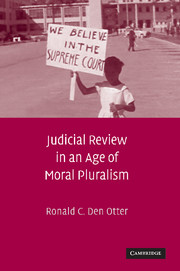Book contents
- Frontmatter
- Contents
- Acknowledgments
- Introduction
- 1 Public Justification and Constitutional Theory
- 2 Freedom and Equality in Constitutional History
- 3 The Challenge of Public Justification
- 4 Competing Conceptions of Public Reason
- 5 Constitutional Public Reason
- 6 The Limits of Public Justification
- 7 Standard Objections to Public Reason
- 8 Easier Cases
- 9 Harder Cases
- 10 The Case for Judicial Review
- Conclusion
- References
- Index
- References
Conclusion
Published online by Cambridge University Press: 17 December 2010
- Frontmatter
- Contents
- Acknowledgments
- Introduction
- 1 Public Justification and Constitutional Theory
- 2 Freedom and Equality in Constitutional History
- 3 The Challenge of Public Justification
- 4 Competing Conceptions of Public Reason
- 5 Constitutional Public Reason
- 6 The Limits of Public Justification
- 7 Standard Objections to Public Reason
- 8 Easier Cases
- 9 Harder Cases
- 10 The Case for Judicial Review
- Conclusion
- References
- Index
- References
Summary
It is central to the liberal tradition that those who exercise political power should respect the consciences of all persons, and the concept of public justification reflects this concern. An exclusive principle of public reason should protect all persons, not only those who happen to constitute a legislative majority in a particular constitutional controversy. In the absence of adequate justification for legal prohibition, people should be allowed to do what they would like to do, and they should not be treated unequally. That is a principle that any society that is committed to respecting the freedom and equality of all of its members must endorse. Otherwise, lawmakers will impose laws on those who do not have adequate reasons to accept them. As much as possible, in developing an ideal approach to constitutional adjudication based on public justification, I have tried to avoid making unrealistic assumptions about human and institutional capabilities. This is a problem that anyone who cares about improving American politics has to face squarely: how stark is the difference between what constitutional democracy is and what it could be under better circumstances? On the one hand, a political or constitutional theorist who believes that America could be more just or more democratic cannot be satisfied with the status quo. In a country that not only has great wealth but also an enviable constitutional tradition, life could be better for many persons in a number of important ways.
- Type
- Chapter
- Information
- Judicial Review in an Age of Moral Pluralism , pp. 316 - 318Publisher: Cambridge University PressPrint publication year: 2009



